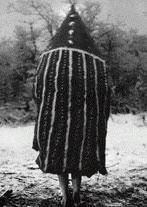
 |
|||||||
 |
|||||||
 |
|||||||
 |
|||||||
 |
|||||||
 |
|||||||
 |
|||||||
| sitemap | |||||||

Jamie Muir è stato un musicista senza barriere.
Iniziò la sua carriera al trombone in band jazz, poi passò
alla batteria e alle percussioni con un approccio del tutto libero. Suonò
per due anni con l’Edinburgh free-jazz ensemble The Assassination
Weapon poi seguì Derek Bailey nel suo progetto The Music Improvisation
Company. Nel 1971 Muir si unì al gruppo di rock africano Assaggi.
Qualche tempo dopo Robert Fripp gli fece la proposta che l’ha consegnato
all’obliquità, seguirlo nell’ennesima incarnazione
del re cremisi. La sezione ritmica dei crimson era formata da John Wetton
al basso, da Bill Bruford alla batteria e da Jamie Muir che percuoteva
e utilizzava tutto ciò che era possibile: fogli di metallo, catene,
richiami per uccelli, bottiglie di plastica, letti di foglie secche, seghe. * King Crimson were the only really famous band I’d been in. Fripp
was open and believed very much in getting disparate musical elements
together, a mixture to produce interesting music, although this was difficult
to hold together as the history of King Crimson would suggest. When we
rehearsed, we thrashed about and tried to make things work in an improvisational
way in the studio. Fripp was definitely the boss, there’s no question
about it. And that was fine, he seemed to me to be a very good band leader.
I think I was a wee bit too much for him, simply because I was so involved
in improvisation. He was very much concerned with logic and function,
he always worked his solos out before playing them. He had very fastidious
and tight sort of habits. |

